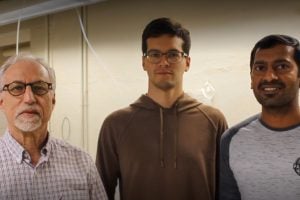
A team of Johns Hopkins materials scientists developing an electronic device for sensing and analyzing chemical compounds in human breath to monitor health was recognized with a National Science Foundation I-Corps “Embracing the Process” award last week for excellence in following the seven-week program’s steps for preparing scientists and engineers to move their projects toward commercialization.
The team, Ultraflextronics, is led by Howard Katz, professor of materials science and engineering; post-doctoral fellow Sasikumar Mayarambakam; PhD candidate Riley Bond; and Steve Aubuchon, a market and business development expert at W.L. Gore & Associates, a global materials science company focused on discovery, product innovation, and a commitment to improving lives.
“The award is a recognition of having met the goals and gone through the different steps and activities of the I-Corps program,” says Katz.
That sounds easier than it is, according to Katz, who explains that the I-Corps program is both a crash course in business—revenue, supply chains, and customer relations—and deep-market analysis, requiring team members to interview at least 100 potential partners and customers to gain an understanding of where their technology could fit into the market.
“There are certain business principles that you’re supposed to follow,” Katz says. “How do you do interviews? What are you supposed to get out of the interviews? How do you organize the data from all different kinds of people? How do you organize that into certain principles? We heard that from startup companies, we heard from gigantic companies. And we started to listen for those things.”
One of the things Katz and collaborators heard repeatedly in their interviews was that the “humidity problem” in current gas-sensing technologies is a major obstacle. Humidity is a measure of the amount of water in a gas composition, so it is picked up by technology made to sense gases. The struggle for the breath-sensing technologies currently on the market is selectivity, filtering gases that are not of particular interest, like humidity.
After completing the I-Corps process, engineers are free to choose how to approach commercialization, whether it be starting a company, licensing their technology, or another route.
“The next step is to demonstrate our technology in a way that best meets the needs of users and customers according to what we heard in the interviews,” says Bond.
Now, Ultraflextronics has a separate grant to do the research suggested by the I-Corps program. According to Katz, “Our research will proceed to develop new materials and sensor architectures to maximize selectivity for gases most directly associated with health conditions for which easier monitoring would be most beneficial.”